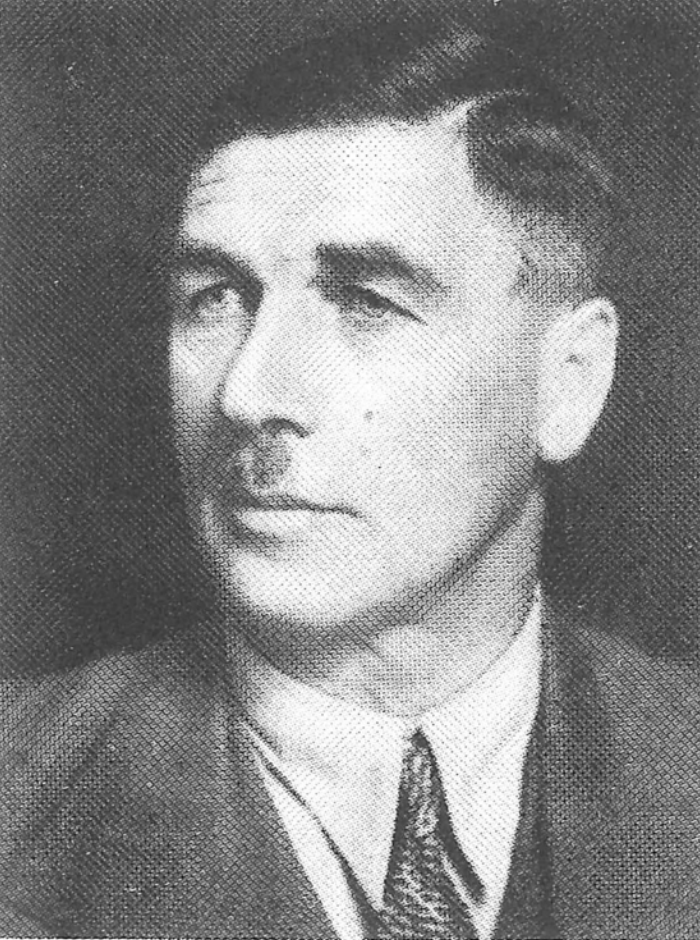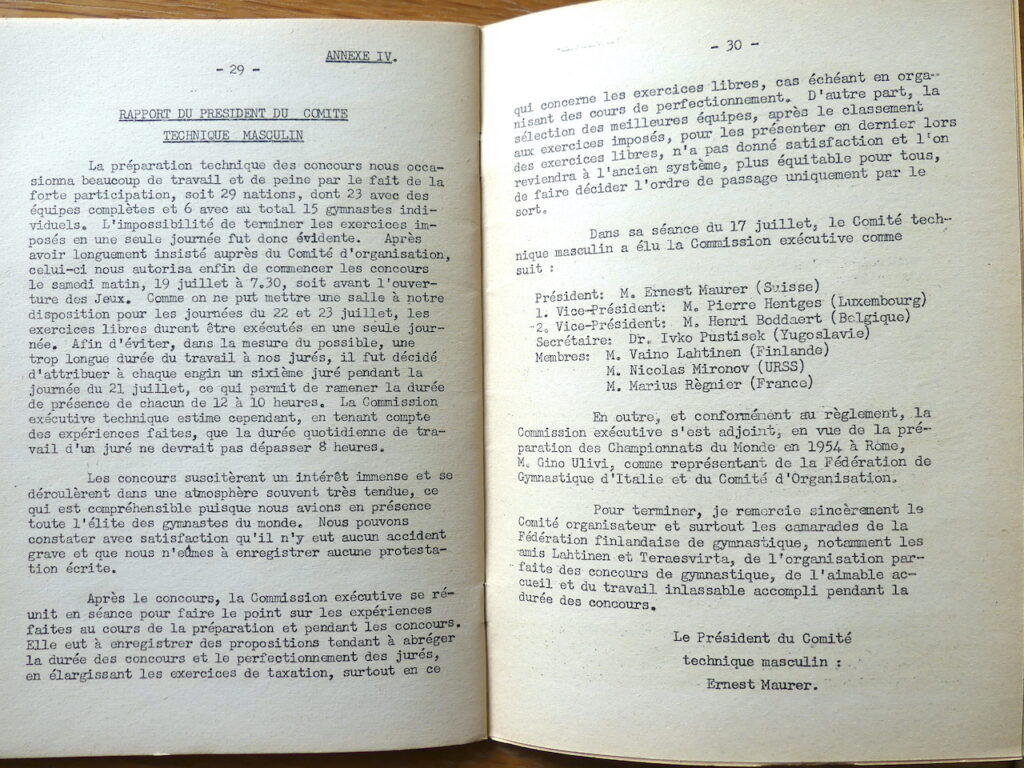How many hours should a judge work every day? In 1952, the Men’s Technical Committee thought that 8 hours should be the maximum. (Judges, how many hours do you work daily at competitions?)
Here’s a translation of the 1952 report by Ernest Maurer, President of the Men’s Technical Committee. You can read the full minutes for the Men’s Technical Committee meetings here.

REPORT BY THE PRESIDENT OF THE MEN’S TECHNICAL COMMITTEE
The technical preparation of the competitions required a great deal of work and effort, due to the high level of participation: 29 nations, 23 with complete teams and 6 with a total of 15 individual gymnasts. The impossibility of completing the compulsory exercises in a single day was therefore obvious. After insisting at length to the Organizing Committee, they finally authorized us to start the competitions on Saturday morning, July 19 at 7.30 a.m., i.e. before the opening of the Games. As a hall could not be made available to us for July 22 and 23, the optional exercises had to be performed on a single day. In order to avoid, as far as possible, our judges having to work for too long, it was decided to allocate a sixth judge to each apparatus on July 21, thus reducing the time spent by each judge from 12 to 10 hours. However, in light of experience, the Technical Executive Committee considers that the daily working time of a judge should not exceed 8 hours.
The competitions aroused immense interest and were often held in a very tense atmosphere, which is understandable given that the world’s elite gymnasts were in attendance. We are pleased to report that there were no serious accidents and no written protests.
After the competition, the Executive Committee held a meeting to review the experiences gained in the run-up to and during the competitions. Proposals were put forward to shorten the duration of the competitions and to improve the skills of the judges, by broadening the range of scoring exercises, especially regarding optional exercises, and, if necessary, by organizing advanced training courses.
At its meeting on July 17, the Men’s Technical Committee elected the Executive Committee as follows:
President: Mr. Ernest Maurer (Switzerland)
1. Vice President: Mr. Pierre Hentges (Luxembourg)
2. Vice Presdient: Mr. Henri Boddaert (Belgium)
Secretary: Dr. Ivko Pustišek (Yugoslavia)
Members: Mr. Väinö Lahtinen (Finland)
Mr. Nicolas Mironov (USSR)
Mr. Marius Règnier (France)
In addition, and in accordance with the regulations, the Executive Committee has appointed Mr. Gino Ulivi to represent the Italian Gymnastics Federation and the Organizing Committee in the preparations for the 1954 World Championships in Rome.
In conclusion, I would like to express my sincere thanks to the Organizing Committee and especially to my comrades from the Finnish Gymnastics Federation, especially our friends Lahtinen and Teräsvirta, for the perfect organization of the gymnastics competitions, the kind welcome and the tireless work carried out during the competitions.
The President of the Men’s Technical Committee:
Ernest Maurer.

The French Original
RAPPORT DU PRESIDENT DU COMITE TECHNIQUE MASCULIN
La préparation technique des concours nous occasionna beaucoup de travail et de peine par le fait de la forte participation, soit 29 nations, dont 23 avec des équipes complètes et 6 avec au total 15 gymnastes individuels. L’impossibilité de terminer les exercices imposés en une seule journée fut donc évidente. Après avoir longuement insisté auprès du Comité d’organisation, celui-ci nous autorisa enfin de commencer les concours le samedi matin, 19 juillet à 7.30, soit avant l’ouverture des Jeux. Comme on ne put mettre une salle à notre disposition pour les journées du 22 et 23 juillet, les exercices libres durent être exécutés en une seule journée. Afin d’éviter, dans la mesure du possible, une trop longue durée du travail à nos jurés, il fut décidé d’attribuer à chaque engin un sixième juré pendant la journée du 21 juillet, ce qui permit de ramener la durée de présence de chacun de 12 à 10 heures. La Commission exécutive technique estime cependant, en tenant compte des expériences faites, que la durée quotidienne de travail d’un juré ne devrait pas dépasser 8 heures.
Les concours suscitèrent un intérêt immense et se déroulèrent dans une atmosphère souvent très tendue, ce qui est compréhensible puisque nous avions en présence toute l’élite des gymnastes du monde. Nous pouvons constater avec satisfaction qu’il n’y eut aucun accident grave et que nous n’eûmes à enregistrer aucune protestation écrite.
Après le concours, la Commission exécutive se réunit en séance pour faire le point sur les expériences faites au cours de la préparation et pendant les concours. Elle eut à enregistrer des propositions tendant à abréger la durée des concours et le perfectionnement des jurés, en élargissant les exercices de taxation, surtout en ce qui concerne les exercices libres, cas échéant en organisant des cours de perfectionnement. D’autre part, la sélection des meilleures équipes, après le classement aux exercices imposés, pour les présenter en dernier lors des exercices libres, n’a pas donné satisfaction et l’on reviendra à l’ancien système, plus équitable pour tous, de faire décider l’ordre de passage uniquement par le sort.
Dans sa séance du 17 juillet, le Comité technique masculin a élu la Commission exécutive comme suit:
Président: M. Ernest Maurer (Suisse)
1. Vice-Président: M. Pierre Hentges (Luxembourg)
2. Vice-Président: M. Henri Boddaert (Belgique)
Secrétaire: Dr. Ivko Pustisek (Yugoslavie)
Membres: M. Vaino Lahtinen (Finlande)
M. Nicolas Mironov (URSS)
M. Marius Règnier (France)
En outre, et conformément au règlement, la Commission exécutive s’est adjoint, en vue de la préparation des Championnats du Monde en 1954 à Rome, M. Gino Ulivi, comme représentant de la Fédération de Gymnastique d’Italie et du Comité d’Organisation.
Pour terminer, je remercie sincèrement le Comité organisateur et surtout les camarades de la Fédération finlandaise de gymnastique, notamment les amis Lahtinen et Teraesvirta, de l’organisation parfaite des concours de gymnastique, de l’aimable accueil et du travail inlassable accompli pendant la durée des concours.
Le Président du Comité technique masculin:
Ernest Maurer.
More on 1952